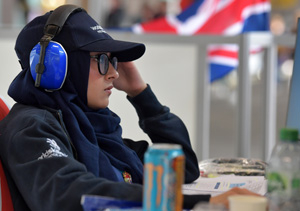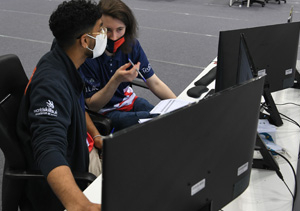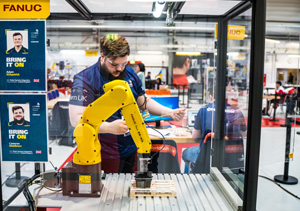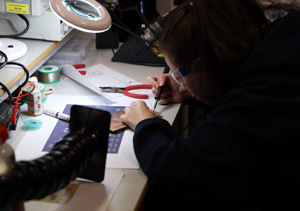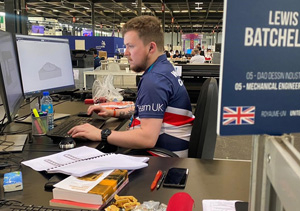| T-levels | | | |
| Employer Industry Board for Building Services Engineering | Refrigeration and Air Conditioning | Mark Forsyth | Ensure industry’s skills needs are met in new qualification development |
| Creative Craft (Upholstery, Furniture, Ceramics, Textiles and Jewellery) T Level panel | Furniture and Cabinet Making | Christian Notley | Ensure industry’s skills needs are met in new qualification development |
| City & Guilds Construction T Level Panel | Construction | Peter Walters | Ensure industry’s skills needs are met in new qualification development |
| IfATE Hair and Beauty T Level Panel | Hair and Beauty | Jenna Wrathall | Ensure industry’s skills needs are met in new qualification development |
| IfATE Digital route panel | Cyber Security | Suresh Kumar | Ensure industry’s skills needs are met in new qualification development |
| IfATE Care Services route panel | Health & Social Care | Jason Warriner | Ensure industry’s skills needs are met in new qualification development |
| Apprenticeships | | | |
| L3 Trailblazer (6090-50) for Refrigeration, air-conditioning and heat pump systems | Refrigeration and Air Conditioning | Mark Forsyth | Co-authored qualification or standard |
| L2 & L3 Trailblazer for Furniture and Upholstery | Furniture and Cabinet Making | Christian Notley | Co-authored qualification or standard |
| L3 Trailblazer for the Electrical Electronics Consumer Service and Installation Industry Standard ST0150 | Electronics | Stephen Williams | Developed qualification or standard |
| Chairman: Home Electrical Electronics Skills Training Forum (HEEST) - various | Electronics | Stephen Williams | Developed qualification or standard |
| Up to L3 City and Guilds Apprenticeship Standards | Joinery and Site Carpentry | Andy Pengelly | Developed qualification or standard |
| L2 Standard Painting and Decorating Association Education Committee | Painting and Decorating | Peter Walters | Informed development of qualification or standard |
| Scottish Association of Painting Craft Teachers (SAPCT) - various | Painting and Decorating | Michael Swan | Informed development of qualification or standard |
| Vocational qualifications | | | |
| SQA L4/5 Digital Construction | Digital Construction | Michael McGuire | Authored qualification or standard |
| L3-7 Electronic Commerce (EC) Council Organisation – various | Cyber Security | Suresh Kumar | Authored qualification or standard |
| L1 – L3 City & Guilds Furniture, wood machining and upholstery qualifications - various | Furniture and Cabinet Making | Christian Notley | Co-authored qualification or standard |
| SQA HND Computer Aided Draughting and Design (Lead Academic/Chair) | Computer Aided Draughting and Design | Barry Skea | Developed qualification or standard |
| SQA HND Computer Aided Architectural Design and Technology (Lead Academic/Chair) | Computer Aided Architectural Design and Technology | Barry Skea | Developed qualification or standard |
| City and Guilds VRQ Hospitality and Catering - various | Restaurant Services | Shyam Patiar | Developed qualification or standard |
| City & Guilds Joinery & Carpentry - various | Joinery and Carpentry | Andy Pengelly | Developed qualification or standard |
| L3-7 Vendor academy programmes include; CISCO, Microsoft, PaloAlto, VMware, Huawei | IT and Digital | Suresh Kumar | Developed qualification or standard |
| Qualification Wales: Engineering - various | Engineering | Stephen Williams | Informed development of qualification or standard |
| Department for Education Northern Ireland Hospitality Skills Curriculum Hub - various | Cooking | Sean Owens | Informed development of qualification or standard |
| L2 Professional Chef Diploma Food and Drink Qualifications (FDQ) | Cooking | Sean Owens | Informed development of qualification or standard |
| L3 FDQ Culinary Arts exams - various | Cooking | Sean Owens | Informed development of qualification or standard |
| NVQs Culinary Arts for Sectoral Skills Council in Hospitality - various | Cooking | Sean Owens | Informed development of qualification or standard |
| Qualification Wales Advisory Group 2021 - various | Cooking | Sean Owens | Informed development of qualification or standard |
| Higher technical qualifications | | | |
| L4/5 HTQ Furniture Production and Design | Furniture and Cabinet Making | Christian Notley | Developed qualification or standard |
| Other | | | |
| Degree qualification with Belfast Metropolitan College and Open University in 2022 | Cooking | Sean Owens | Co-authored qualification or standard |
| Civilian and military aviation training policies and qualifications - various | Aircraft Maintenance | James Callaghan | Informed development of qualification or standard |
| HABIA - Hair and Beauty Industry Authority (Board of Directors) | Hair and Beauty | Jenna Wrathall | Informed development of qualification or standard |
| Skills Active for Active Leisure, Learning and Well-Being (Board of Directors) | Beauty | Jenna Wrathall | Informed development of qualification or standard |
| Member of National Hair and Beauty Federation | Hairdressing | Linzi Weare | Informed development of qualification or standard |
